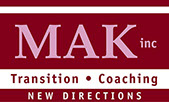MENU
EXECUTIVE COACHING
& MENTORING
Executive Coaching & Mentoring Programs provide management with support to develop and help employees throughout the organization to grow.
Coaching is a useful way of developing people's skills and abilities, and of boosting performance. It can also help deal with issues and challenges before they become major problems.
A coaching session will typically take place as a conversation between the coach and the coachee (person being coached), and it focuses on helping the coachee discover answers for themselves. After all, people are much more likely to engage with solutions that they have come up with themselves, rather than those that are forced upon them!
In some organizations, coaching is still seen as a corrective tool, used only when things have gone wrong. But in many companies, coaching is considered to be a positive and proven approach for helping others explore their goals and ambitions, and then achieve them.
Coaches in the workplace are not counselors, psychotherapists, gurus, teachers, trainers, or consultants – although they may use some of the same skills and tools.
Most formal, professional coaching is carried out by qualified people who work with clients to improve their effectiveness and performance, and help them achieve their full potential. Coaches can be hired by coachees, or by their organizations. Coaching on this basis works best when everyone clearly understands the reason for hiring a coach, and when they jointly set the expectations for what they want to achieve through coaching.
However, managers and leaders in the organization can be just as effective as externally hired coaches. Managers don't have to be trained formally as coaches. As long as they stay within the scope of their skill set, and maintain a structured approach, they can add value, and help develop their people's skills and abilities.
More and more organizations are harnessing the expertise of a Business or Executive coach. The coach is almost always an agent of change. The coach will never tell someone what to do, but they will ask the tough questions. The client receives assistance to determine the areas in which change may be desired and even necessary, and the coach supports a coarse of action to achieve the desired change(s). The specific reasons for engaging a coach are numerous:
• fast tracking a key employee,
• supporting newly or soon to be promoted managers,
• assist with poor performing employees,
• support Peak Performance for middle managers, top managers, sales executives and other key employees
Mentoring is a learning and development partnership between someone with vast experience and someone who wants to learn. It is a transfer of wisdom extracted from experience for the purpose of empowering and growing a client. "Mentoring" is a process that always involves communication and is relationship-based. It entails informal communication, usually face-to-face and during a specific or sustained period of time
Typically, the client comes to the mentor with questions … questions for discussion and extracting information.
Often an owner, president or CEO will identify certain behavioural tendencies in key management personnel or management prospects. The coach works with the candidate(s) to work on changing specific behaviours that may be standing in the way of productive performance or career advancement.
Many owners, Presidents, Vice Presidents, CEO’s and other top management realize they must change the way they deal with their people. The coach helps the client identify the necessary behavioural change and works to help the client establish goals and maintain a plan of action.
When a change in
behaviour is desired
Achieving Peak
Performance
There are times when every person gets into a “rut” and requires assistance to “move forward”.
Top performers often have tremendous desire to maintain a high level of performance. The coach works with them to establish a strategy to keep them challenged and performing
Support for emerging top performers
Support for those with potential to assist in the development of appropriate goals, good work habits and maintain an upwardly mobile track. A coach can help the employee with less experience with navigating their way through the corporate maze, encouraging the development of skills necessary for the client to grow within the organization.
Fast Tracking a Key Employee
A coach can enable an employee to advance faster in his career path through careful direction and support. In these days of shortage of those with skills and experience, a coach can most often enable less experienced people quickly become a valuable asset at a higher corporate level.
The promotion of a new manager
All businesses struggle with the best way to promote a production employee or sales employee into a management position in a way that will set them up to be successful. Too often these employees are “thrown to the wolves” with little or no support. A coach works with the unskilled new manager and quietly and supports the development of necessary management and communication skills. There are many variables in the promotion of new management people which a coach can help the client deal with.
Poor performance
It can be costly for a business to keep a poor performer on staff. Many times, there are unknown circumstances directly effect the performance of one who is struggling. The coach works to, confidentially, identify the cause of the problem, help the client work to overcome the obstacles in his/her way and support a strategy for improvement.
It can be costly for a business to terminate the employment of a poor performer. The investment in a coach to help the employee improve performance and support changes in the employee’s behaviour can be far less than a dismissal and all the associated costs like severance, recruiting and retraining a replacement.
Coaching is most effective in three month packages. Any coaching relationship will normally see an initial increase in energy and enthusiasm, then experience a let-down after the first six to eight weeks. The involvement of the coach is critical during these adjustment periods down to keep the client moving forward, and not allowing him/her to drift off and be unsuccessful.
Coaching Packages


Mak Consulting Inc.© 2016